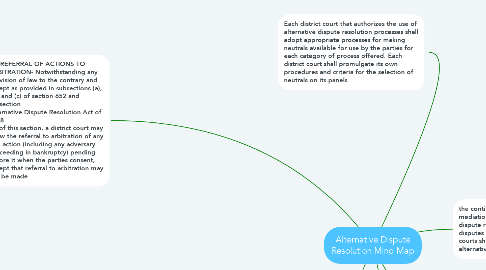Alternative Dispute Resolution Mind Map
by Bahari Gower

1. `(a) REFERRAL OF ACTIONS TO ARBITRATION- Notwithstanding any provision of law to the contrary and except as provided in subsections (a), (b), and (c) of section 652 and subsection Alternative Dispute Resolution Act of 1998 (d) of this section, a district court may allow the referral to arbitration of any civil action (including any adversary proceeding in bankruptcy) pending before it when the parties consent, except that referral to arbitration may not be made
1.1. `(a) POWERS OF ARBITRATORS- An arbitrator to whom an action is referred under section 654 shall have the power, within the judicial district of the district court which referred the action to arbitration--
1.2. `(1) to conduct arbitration hearings;
1.3. `(2) to administer oaths and affirmations; and `(3) to make awards.
2. Each district court that authorizes the use of alternative dispute resolution processes shall adopt appropriate processes for making neutrals available for use by the parties for each category of process offered. Each district court shall promulgate its own procedures and criteria for the selection of neutrals on its panels
3. certain forms of alternative dispute resolution, including mediation, early neutral evaluation, minitrials, and voluntary arbitration, may have potential to reduce the large backlog of cases now pending in some Federal courts throughout the United States, thereby allowing the courts to process their remaining cases more efficiently
4. CONSIDERATION OF ALTERNATIVE DISPUTE RESOLUTION IN APPROPRIATE CASES- Notwithstanding any provision of law to the contrary and except as provided in subsections (b) and (c), each district court shall, by local rule adopted under section 2071(a), require that litigants in all civil cases consider the use of an alternative dispute resolution process at an appropriate stage in the litigation. Each district court shall provide litigants in all civil cases with at least one alternative dispute resolution process, including, but not limited to, mediation, early neutral evaluation, minitrial, and arbitration as authorized in sections 654 through 658. Any district court that elects to require the use of alternative dispute resolution in certain cases may do Alternative Dispute Resolution Act of 1998 so only with respect to mediation, early neutral evaluation, and, if the parties consent, arbitration.
5. of alternative dispute resolution processes in all civil actions, including adversary proceedings in bankruptcy, in accordance with this chapter, except that the use of arbitration may be authorized only as provided in section 654. Each United States district court shall devise and implement its own alternative dispute resolution program, by local rule adopted under section 2071(a), to encourage and promote the use of alternative dispute resolution in its district.
6. the continued growth of Federal appellate court-annexed mediation programs suggests that this form of alternative dispute resolution can be equally effective in resolving disputes in the Federal trial courts; therefore, the district courts should consider including mediation in their local alternative dispute resolution program


